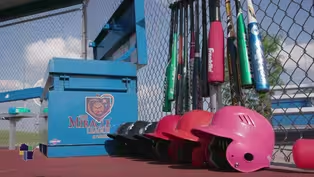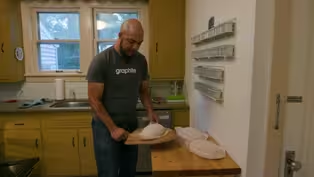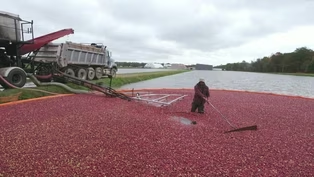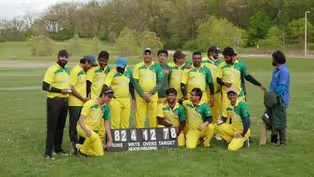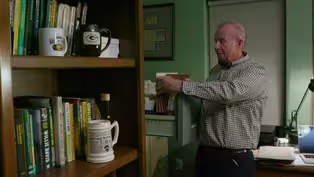
Diamond Dreams
Season 9 Episode 4 | 26m 48sVideo has Closed Captions
Angela joins the Miracle League of the Fox Valley, a program offering adaptive baseball.
It’s time to take the field in Appleton as Angela Fitzgerald joins the Miracle League of the Fox Valley, a program offering kids with disabilities the opportunity to play baseball. We talk with a player and his dad to find out why the program is so special. We also share the stories of other people doing extraordinary things.
Problems playing video? | Closed Captioning Feedback
Problems playing video? | Closed Captioning Feedback
Wisconsin Life is a local public television program presented by PBS Wisconsin
Funding for Wisconsin Life is provided by the Wooden Nickel Fund, Mary and Lowell Peterson, A.C.V. and Mary Elston Family, Leon Price & Lily Postel, Stanley J. Cottrill Fund, UW...

Diamond Dreams
Season 9 Episode 4 | 26m 48sVideo has Closed Captions
It’s time to take the field in Appleton as Angela Fitzgerald joins the Miracle League of the Fox Valley, a program offering kids with disabilities the opportunity to play baseball. We talk with a player and his dad to find out why the program is so special. We also share the stories of other people doing extraordinary things.
Problems playing video? | Closed Captioning Feedback
How to Watch Wisconsin Life
Wisconsin Life is available to stream on pbs.org and the free PBS App, available on iPhone, Apple TV, Android TV, Android smartphones, Amazon Fire TV, Amazon Fire Tablet, Roku, Samsung Smart TV, and Vizio.
Providing Support for PBS.org
Learn Moreabout PBS online sponsorship- The following program is a PBS Wisconsin original production.
- Angela: Coming up on Wisconsin Life: a classroom connecting to cranberries, two cricket players teaming up to win, a baker combining two of his passions: bread and justice, and the official historian of the Green Bay Packers.
It's all ahead on Wisconsin Life.
[upbeat music] - Funding for Wisconsin Life is provided by Lowell and Mary Peterson, Alliant Energy, A.C.V.
and Mary Elston family, Focus Fund for Wisconsin Programs, and Friends of PBS Wisconsin.
- Welcome to Wisconsin Life!
I'm Angela Fitzgerald.
Batters up as we join the Miracle League of the Fox Valley, a program of Goodwill of North Central Wisconsin, where children with disabilities take the field to play baseball.
Games are played at Appleton Memorial Park on the Miracle League field, an accessible rubber baseball diamond that is safe for athletes.
Two games are played a night, Monday through Thursday, throughout the summer.
During each inning, every player, with their volunteer buddy, gets a chance to hit the ball, run the bases, and score a run for their team, [cheering] all while the crowd cheers them on.
The games help players build confidence while learning communication and teamwork skills.
At the end of the game, everyone is a winner.
This program impacts the lives of 200 players and their families each year with the help of 300 volunteers.
Before we round the bases with the Miracle League, let's head out around the state.
We join a class in Pittsville teaching the importance of Wisconsin's cranberry connection.
[murmur of cranberries rolling] Fall brings a flood of red, delicious cranberries.
[soft piano music] Wisconsin is by far the largest growing region in the world.
- Lindsay Meissner: Specifically, Wood County grows up to 60% of our nation's cranberries.
So, it's quite impressive.
We have a really great climate for it.
It is a native fruit crop, so we do have the soil conditions and the environmental conditions necessary for growing a perennial berry crop.
- Angela: Not only is Pittsville the geographic center of our state, but at the very center of that cranberry production.
- Pittsville is a very unique, diverse agricultural area.
- Angela: And there's something else about this city's unique cranberry connection.
- Lindsay: We believe that we're the only Cranberry Science class in our entire nation.
Overall, like I said, I thought it went really well.
- Angela: Lindsay Meissner teaches that one-of-a-kind Cranberry Science class.
- I did grow up in the Marshfield area, so in Wood County.
Most of my knowledge, however, has come from teaching the class the last five years.
- Joey Redmond: This class is important because it tells you about the life cycle of cranberries and not a lot of people know that Wisconsin's number one producing crop is cranberries.
It's the cheese state.
But in reality, Wisconsin is kind of the cranberry state.
- Angela: Sharing the pride about the local cranberry crop starts at an early age.
- Aiden Kolar: Good morning.
Welcome to the Splash of Cranberry Tour.
I am Aiden with the Pittsville High School Cranberry Science class.
- Angela: Tours guided by high school students provide a direct encounter with Wisconsin's cranberry industry.
- Aiden Kolar: The word "cranberry" originated from the Dutch German settlers "crane berry" because the blossom of a cranberry looks like the head and neck of a crane.
- Lindsay Meissner: People are just curious about cranberries.
Hi, this is our 21st year of cranberry tours.
For the guests to be able to go out and see the production and harvesting is definitely a unique aspect to the course.
- Sara LaCoursiere: Hello, my name is Sara, and I'm also a senior at Pittsville High School.
- Angela: For Sara LaCoursiere, Cranberry Science provides a hands-on lesson from the land.
- We learn about pests and deer.
We also learn about how everything works and the processes and a little bit more about the equipment.
- Angela: The Cranberry Tour shows what it takes to support a berry crop.
- Child: Hey, lookit!
- And how it generates nearly a billion dollars in revenue and 4,000 jobs.
- Sara: They got to see a actual person out there harvesting with the waders on.
- Joey: The berries being corralled and separated from the waste.
They also get cleaned a little bit going up into the hopper and then going into the truck.
- All right, who enjoyed the marsh?
- Child: Yeah.
- Joey: You thought it was pretty cool, yeah?
- Group: Yeah.
- Angela: Right about now, their curiosity about cranberries is peaking.
- That is a great question.
So why didn't we get to try any of the berries?
So, the berries actually that are on the marsh are not cleaned yet.
- Angela: And the cleaning station is where they're headed next.
- Joey Redmond: And the second stop is where the berries are dumped and they go into that big pit.
They get sucked up and then they go into the cleaning station.
95% of them go to being juices, and then they also become sweet and dried cranberries.
- Angela: But there is still a lot of work to get this fruit from the farm to the table.
- Lindsay Meissner: Which includes the binning of the berries, the lab testing of the berries, and then, the freezer side of the berries.
- A lot of people do know about cranberries and about the cranberry juice, but they don't know the process that it goes through.
I find the lab area the most interesting, and that's where they test the color spectrums and sugar content.
- Angela: The science class may be about cranberries, but in the end, it's about growing a sense of community.
- Joey Redmond: I have been living on a cranberry marsh since 2009.
It's been in our family since I was a little kid.
- Sara LaCoursiere: A couple years ago, we actually did one of these tours.
We went through 'em when we were younger just like they did.
It's very cool.
I mean, it's definitely something I've wanted to do since I entered high school.
- Lindsay Meissner: They actually learn to appreciate why Pittsville is Pittsville.
Appreciating where they come from... - Thank you, you guys are awesome!
- ...And that's how communities stay successful.
[happy conversations in background] - Angela: We head off now to Green Bay to connect with a newspaperman turned Packers historian.
Being a newspaper reporter has been Cliff Christl's lifelong passion.
- Cliff: I've spent close to 40 years in the newspaper business.
- Angela: Nearly all of those years writing about just one topic.
- Most of it was spent writing about the Packers.
I think I had a reputation for being a rather aggressive reporter.
- Angela: After decades working in news, Cliff had one more story to tell.
- Cliff: Once the Packers were nearing their 100th season, they wanted to write a book.
They approached me.
- Angela: The reporter who made a career writing about the Packers is now employed by the team.
- And one of my friends told me when I took the job, that if Cliff Christl was still alive, he wouldn't tolerate this.
- Angela: All joking aside, Cliff got the assignment of a lifetime, and a monumental task of writing a story 100 years in the making.
- Cliff: If I'm going to even come close to writing a definitive history, it can't be done, especially with the Packer's rich history, in 300, 500 pages.
So, it grew into a four-volume thousand-page book.
The title of our book is "The Greatest Story in Sports" and I don't think there's any question about that.
[upbeat music] - Angela: Walking into Lambeau Field as the Packers historian comes with a certain cachet.
- I had to have one of the most coveted jobs in America.
I don't know if that's the case, but it's-- I've enjoyed it.
- Angela: What Cliff also enjoys is debunking myths surrounding the green and gold.
- The most surprising thing since I've worked for the Packers is the number of people who tell me that they have a grandfather or an uncle or somebody who played for the Packers who never did.
And I see it in obituaries.
- Angela: Cliff is a walking encyclopedia of football facts.
- These are the games.
- Angela: His personal Packers archive is one for the ages.
- Seven file cabinets with about 25 drawers.
Every story written about the Packers through their first 100 seasons.
Here's my file on Curly Lambeau, and then I have a full file drawer of probably 300 to 500 interviews and oral histories done with Packers officials, coaches, scouts, players, et cetera.
Here's my Prohibition file.
- Angela: Packers and Prohibition.
It's one of his favorite subjects to explore.
- Green Bay was known as the favorite stop for every team in the league.
The bar scene didn't change from before Prohibition, and there was a thriving Red-Light District on the north side.
[bouncy jazz music] It was Sin City.
And how much of a factor that was in the Packers survival, that's what always has impressed me about the spirit of Green Bay.
- Angela: Cliff's impressions with the team go way back.
- I'm a Green Bay native.
Started attending games in the '50s.
A ticket cost 75 cents per game and a season ticket was $2.25.
- Angela: A lot has changed since those days, in more ways than one.
- So, I was a Bears fan, and the Packers were lousy at that point.
This was 1955, and they continued to be lousy until Vince Lombardi arrived.
And that's when I became a Packer fan, when they started winning under Lombardi.
This is the exhibit of the 1961 NFL Championship Game.
It was Lombardi's first title.
First time a championship game had been played in Green Bay.
That's probably my favorite game of all time.
I just remember how excited the entire city was.
- Angela: In 2011, it took that former Bears fan to launch the Green Bay Packer's Heritage Trail.
- It's a walking tour patterned after the Freedom Trail in Boston.
I conceived the idea, putting up plaques at certain historical sites.
Plenty landmarks where significant Packer history took place.
[whimsical marimba music] - Angela: The fact of the matter is Cliff uncovered a treasure trove of Packers stories during his journalism career.
- Cliff: Give my bosses a good hard day's work.
- Angela: He may have saved his best work for last.
- And I love to research, love to be a reporter.
A little different working for the team than it was for a newspaper.
That's why the opportunity to work for the Packers as a historian was such a godsend.
It gave me deadlines.
Otherwise, I'd probably continue to research until it was time to hit the grave.
[announcer on PA, crowd cheering] - We're in Appleton to learn more about the players and volunteers stepping up to the plate with the Miracle League of the Fox Valley.
The Miracle League of the Fox Valley, a program of Goodwill of North Central Wisconsin, brings players of all abilities onto the field for games, fun, and a chance to score a run for their team.
We met with Heather Hietpas, the program leader, to find out more about the organization.
- Miracle League of the Fox Valley is about kids with disabilities coming and playing baseball.
They're allowed to play on an adaptive field and just get to be on a team.
They learn teamwork.
They learn social skills.
They learn even just following directions.
It's the baby steps to the employment skills that they will learn as they get older.
Before this role, I was a coach, and I personally watched one player wouldn't even come on the field whatsoever at all.
And then, by the end of the season, he was hitting, running, ready to go.
Lots of changes can happen.
- Crowd: Noah, Noah!
- Angela: Around 300 volunteers participate every season as field announcers, coaches, and buddies who are partnered up with the players for the season.
But for Heather, it's the crowds that really make each game special.
- Man: There we go!
- The crowd.
The crowd is probably the best thing, I think.
The start of the season, they'll get to know their names, and then, by the end, they're cheering their name on, no problem.
So, a complete stranger is cheering you on.
[crowd cheers and applauds] - Angela: Mason and his dad, Nathan, who is also a coach, have been in the Miracle League for six years and enjoy playing year after year.
- Nathan Haberman: The smiles out here are contagious.
The Miracle League is just one of those things that's just an amazing organization for everyone.
The fans, the participants, the players.
It really gives every kid an opportunity to play baseball, and they just light up out here.
Mason, what do you like most about baseball?
You like hitting?
He loves hitting the ball, and all kids do.
I mean, if you watch the game, you'll see when that ball hits the bat, their eyes just light up.
Mason, what did you wanna tell 'em about baseball?
- Mason: I like to play baseball.
- Do you?
With me?
With me?
[Mason vocalizes] And your buddy, Hailey?
- Man: Versus the Nets!
- Angela: The players and volunteers clearly love the game, creating a season of miracles each year.
- Great game!
- Thank you.
- It's a home run for the community and a great way to come together, get kids active, and play ball.
Now, we catch up with a team of cricket players in Fitchburg united by their love of the sport.
[upbeat rock music] - It's like my life, almost my whole life long, I have been playing cricket.
[upbeat rock music] - It is, can I say like a religion in India.
[upbeat rock music] - Angela: Cricket is described as India's obsession.
For Nitesh Singh and Rakesh Cherukuri, it is more than a sport.
- Nitesh Singh: It doesn't see as a country or a state or a religion or a gospel or anything like that.
It just sees the game.
- Angela: This game has united them in more ways than one.
[bird tweets] [soft country music] - Nitesh: Hey, guys.
- Hi, how are you?
- Good, good.
- Nitesh Singh: I grew up in Mumbai.
I've stayed there all my life.
And then, finally, moved to States.
- Angela: Tech jobs attracted both men to the Madison area.
- Nitesh: This game, cricket, actually brought us together.
- Rakesh Cherukuri: Here, in our team or in the league that we play, everyone come from different regions or places from India, and we all talk and play cricket to share the camaraderie that we have.
- Angela: Cricket and camaraderie, both are growing here in Wisconsin.
- Nitesh Singh: We started playing in 2015.
There were only four to five teams.
And today, we have almost 20 teams.
Every team has 11 to 12 players so you can do the math.
- So, this is called a cricket bat, and this is a hard tennis ball.
So, it's a bit hard, but not too hard, not too soft.
- Angela: Professionally, a pitcher or cricket bowler can hurl that ball around 100 miles per hour.
- Here, we don't bowl that fast.
Maybe around 50 miles or 40 miles.
- Angela: Often compared to baseball, both sports use a bat, a ball, and the desire to outscore the opponent.
- Only difference is that in baseball, you basically run four corners.
In cricket, we basically run back and forth.
[jaunty country music] - All: One, two, three, go!
- Announcer: In Wisconsin, cricket is often played on adapted ball diamonds.
And the sports have another thing in common.
- Nitesh: I think it's teamwork, end of the day.
Cricket is not a one-player game.
Eleven players are trying to work together and win a game in, like, two hours window.
- Angela: Cricket can also provide some valuable life lessons.
- Nitesh: There are waves in cricket.
There are lot of emotions in cricket.
[players speaking Hindi] You can very much relate it to your actual life that you go through, right?
[men cheering] So, winning and losing, right, ups and downs.
It keeps you humble and keeps your emotions in check.
[soft rock music] - Angela: There's a sense of pride about this sport in the cricket community.
[soft rock music] A feeling of home in a far-flung land.
[soft rock music] - We lived with cricket in India.
Pure enjoyment.
- If I'm playing, just come and support me, you know.
Cheer for me.
[soft rock music] That's the fun thing and amazing part about cricket.
[soft rock music] [men cheering] - Angela: Next up, we meet a Madison baker mixing two of his passions to raise dough for his community.
♪ ♪ - Mo Cheeks: So, the act of sourdough bread making started for me as a hobby.
You mix flour and water and salt, and you're gonna end up with bread.
Sometimes, I impress myself, though.
Usually, no one's here to see it.
- Announcer: Mo Cheeks knows artisan bread making is very different than his days on the Madison Common Council.
- It's so much more chill than when I was in politics.
- Angela: The pandemic provided this former politician a chance to further pursue his hobby.
- Coincidentally, I started just before the pandemic.
I was not a baker at all, at all, before I took up sourdough baking.
Each of these bins is gonna be 11 loaves.
So, for tomorrow, we're doing 22 loaves of bread.
- Angela: The art of bread making also allows Mo to ease his mind.
- Slowly, methodically, silently in the evening, shaping dough is a really valuable source of self-care for me.
- Angela: It's a time to reflect on how to change the world from the confines of his kitchen.
- As I was thinking about how to process and the realities of injustice in our country, I have found myself with a number of sleepless nights.
And there was something about handmaking the dough that had just become a hobby that now had become a source of sort of therapy for me.
As I'm making this sourdough bread for my family, I realized I have too much bread.
We started to give it away to our friends.
That'll be good.
Bakers Against Racism is certainly the inspiration for sort of how the light bulb first went on for me in terms of thinking about, oh, I don't have to just give this bread away.
- Crowd: Black lives matter, Black lives matter.
- Angela: The racial justice movement provided the missing ingredient for combining two of Mo's passions.
- Crowd: Black lives matter.
- That was the first time that I saw bread and justice come together in a way that I thought, these are my people.
This is exactly what I want to be doing.
- Angela: And with that, Mo starts a micro bakery in his home kitchen, mixing a dash of joy and activism.
- It's called Bread & Justice because I originally created it with community in mind for folks who care deeply about justice and also care about being able to enjoy fresh, local, handmade bread.
So, we started selling it as a fundraiser.
- Angela: Sleepless nights have now given way to early morning wake-up calls.
- As I call it, bake day, wake up at 3:30, preheat the oven.
I set a timer.
And then, around 4:30, you can start loading the dough into the oven.
And that's what we do.
[upbeat music] - Angela: Mo also launched a Bread & Justice newsletter, sharing stories and details about his bake sales.
100% of the proceeds are donated to nonprofits fighting for racial justice.
- I can only make 50 loaves a week.
There's 600 or so people that are on the email newsletters.
This is the fun part about baking in your home oven.
At the end of the day, I can only make so much bread.
Okay, cool.
- Angela: Demand has been overwhelming.
- Got really good rise.
I love that.
It's really moving to me to see so many people be so interested in-- The reason why they want to buy bread from Bread & Justice is because they want to support social justice and anti-racism initiatives.
It's nice, thick, it's nice.
That smells great.
- Angela: Mo's efforts are not going unnoticed.
- It's really good.
- Angela: The World Bread Award selected him as Bread Hero of the Midwest for 2021.
With that recognition comes a sense of satisfaction.
- Mo: And that's awesome.
I'm really proud to be practicing what I preach in terms of doing something to feed the community and knowing that it's feeding not only people's bellies but, hopefully, people's souls as well.
The biggest thing that I take away from Bread & Justice is a reminder that there are so many good people out there that really want to be a part of making the world a better place.
[orchestra music] - We took you out the ball game as it wraps up here with the Miracle League of the Fox Valley and showed more of what Wisconsin has to offer.
Visit WisconsinLife.org to continue exploring the people and places in our state.
And share your ideas with us by emailing stories@WisconsinLife.org.
I'm Angela Fitzgerald, and this is our Wisconsin Life.
Bye.
[upbeat music, crowd cheering] - Funding for Wisconsin Life is provided by Lowell and Mary Peterson, Alliant Energy, A.C.V.
and Mary Elston family, Focus Fund for Wisconsin Programs, and Friends of PBS Wisconsin.
Angela joins the Miracle League of the Fox Valley
Video has Closed Captions
Clip: S9 Ep4 | 2m 55s | Angela joins the Miracle League of the Fox Valley, a program offering adaptive baseball. (2m 55s)
Video has Closed Captions
Clip: S9 Ep4 | 5m 21s | Former Madison politician Mo Cheeks makes bread to feed the racial justice movement. (5m 21s)
Video has Closed Captions
Clip: S9 Ep4 | 4m 44s | Pittsville, Wisconsin is the only place to offer a high school cranberry science class. (4m 44s)
Video has Closed Captions
Clip: S9 Ep4 | 4m 19s | Cricket is described as India’s obsession but for two Madison men it is more than a sport. (4m 19s)
Video has Closed Captions
Clip: S9 Ep4 | 5m 36s | Team Historian Cliff Christl shares what it’s like working for the Green Bay Packers. (5m 36s)
Providing Support for PBS.org
Learn Moreabout PBS online sponsorshipSupport for PBS provided by:
Wisconsin Life is a local public television program presented by PBS Wisconsin
Funding for Wisconsin Life is provided by the Wooden Nickel Fund, Mary and Lowell Peterson, A.C.V. and Mary Elston Family, Leon Price & Lily Postel, Stanley J. Cottrill Fund, UW...
